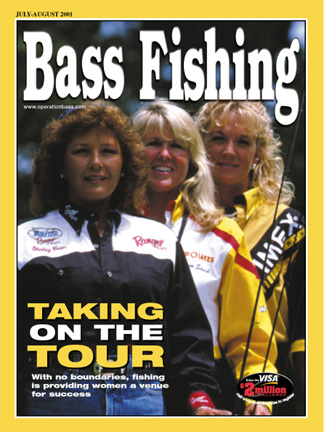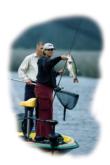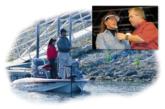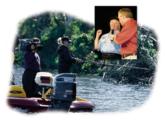Competitive fishing shows a growing allure for women

Women now fish shoulder-to-shoulder with men on the tournament circuits. Although men dominate the upper ranks, women are beginning to claim trophies, prizes and sponsorships.
The bosses of tournament bass fishing boast that it’s a sport without barriers. Even the big-bucks events on TV are open to all comers: men, women, kids, retirees, nobodies, and superstars. Promoters say the fish don’t care who’s on the other end of the line.
It’s true what they say. Most of the men who frowned on female participation or made it tough for women have moved on, or shut up. But the top tiers of competitive bass fishing are still very male, dominated by seasoned pros who are bankrolled by sponsors.
That’s changing. Slowly, perhaps, but inexorably.
At the $1 million Wal-Mart Open on April 25 at Beaver Lake, Ark., 12 of the 350 competitors, from the sport’s top ranks, were women. Not big numbers but indicative of change in one of the few sports where men and women compete shoulder-to-shoulder for the same money. Unlike auto and horse racing where women are still rare, competitive bass fishing counts them among the rank and file.
At Operation Bass, which runs several major tournament trails, two women are fishing the top-tier pro division in its Wal-Mart FLW Tour circuit, which consists of seven major tournaments with $100,000 to $250,000 going to each of the winners. Dozens more fish as “co-anglers,” in the same events for less money.
Big sponsors, which include mass merchandisers such as Pepsi, ALPO and Mars candies along with the more traditional boat, motor and tackle purveyors, are putting together teams. And picking women to fish on them. Half of American drivers are female, so it made perfect business sense for gas giant CITGO to put two women, Tammie Muse and Lucy Mize, on its team. Land O’Lakes, the dairy cooperative, picked Karen Savik and Timex tapped Kristi Rhodes for its team.
Ron Harness, manager of program marketing services for CITGO, says Muse and Mize aren’t part of some “grandiose scheme for women.” The scheme, if you can call it that, is to get a team that reflects the demographics of the company’s market. A Latino, Marcus Padilla, and an African-American, Brian Coleman, fish for CITGO, too.
“We’re family-oriented and so is fishing,” says Bob Beedle, Land O’Lakes’ national accounts manager in charge of the fishing venture.
The reasons more women are competing:
1. The pool of potential competitors is enormous and growing. The latest survey by the U.S. Fish and Wildlife Service (1996) estimates 2.5 million women fish for bass. The National Sporting Goods Association says the number of women who fish grew 5.1 percent between 1998-’99, making it one of the 10 fastest growing participation sports among women.
2. Growing purses are luring more and more anglers of all ages and genders.
3. Tournament organizers, eager to promote events as inclusive and family-oriented-and tap new sponsors-are making the sport more women-friendly.
 The women who compete say the reception they get from the men is good and getting better.
The women who compete say the reception they get from the men is good and getting better.
Shaw Grigsby, who has his own TV show and has earned more than $1 million in tournament purses, says he has learned from the women he has been paired with at events. “Men are pretty much running full tilt all the time,” he says. “We try to make the fish do what we want them to do. Women are more levelheaded. They can concentrate better on the environment they’re fishing and the style needed to catch the fish.”
Just who are these pioneers?
Well, they are moms, career women and business owners. They also are motivated and patient.
“I can do anything a man can do on the water,” says Savik, 46, a businesswoman, catalog model and mother of two from St. Louis Park, Minn.
“But I don’t want it to be about being a woman. I’m competing against the fish.” Still, “men are cautious about me. But I’m not whining. I’m willing to pay my dues.”
 Muse, 41, of Conway, Ark., has the kind of support system-her business partner is also her fishing partner and fiance-to enable her to compete in 90 tournaments a year, spanning five separate circuits. She and Wanda Rucker, 48, finished ninth and 10th respectively in the “co” division in the Wal-Mart FLW Tour event at Lake Okeechobee, Fla., in January, putting Muse on pace for a top-10 season.
Muse, 41, of Conway, Ark., has the kind of support system-her business partner is also her fishing partner and fiance-to enable her to compete in 90 tournaments a year, spanning five separate circuits. She and Wanda Rucker, 48, finished ninth and 10th respectively in the “co” division in the Wal-Mart FLW Tour event at Lake Okeechobee, Fla., in January, putting Muse on pace for a top-10 season.
She doesn’t see as many women competing as she’d like. “I think a lot of women still buy into the idea this is a guy thing.” Which it can’t be entirely because “the men often call me for advice.”
“Eventually,” says Operation Bass owner Irwin Jacobs, “a woman will stand on that stage and win one or two hundred thousand.”
 As Rucker says, “I don’t know how the men feel about us, but at this point, it doesn’t matter.”
As Rucker says, “I don’t know how the men feel about us, but at this point, it doesn’t matter.”